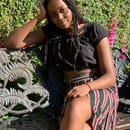In early November 2008, I laid belly-down on my living room floor with my head resting in my hands. My parents stood in front of the TV with their arms crossed. It was tense. The whole house held its breath. Our silence was interrupted when we heard “Barack Obama, 47 years old, will be the President elect of the United states.” The house erupted with cheers. My parents laughed, hugged each other and shed tears of joy. “A black man in The White House” my father said shaking his head. Then he turned to my brother and I and told us that this was the American dream and we could do anything. I stared at the TV, at the man with black skin and hair like mine, and I believed him.
Last summer I told my parents I had an exciting announcement. I was going to chop off my relaxed hair and go natural. My announcement wasn’t met with the enthusiasm I had hoped for. “Are you sure?” my mother asked. “Your hair will be hard to manage.” “Your hair looks so pretty when it’s straight and long,” my father added. I didn’t understand their lack of support at the time. Then I read horror stories of black children being suspended from school because their natural hair was “messy” and their protective styles were considered “distracting” and “unprofessional.” Children were being penalized for daring to embrace the hair that grows out of their head. It was then that I realized that my parents apprehension was a form of protection. This emphasized the fact that not much has really changed in terms of the way this country treats and perceives black people. To understand why and how that is we must delve into this nation’s history.
History has illuminated the fact that society has a distinct predilection to police black bodies. This tendency did not end with slavery. Glenn Martin, president of a social justice firm, talks about how these systems of oppression, like slavery, are durable. They cannot break without pressure. The lack of applied pressure has allowed these systems to mold to fit the constraints of the time period. First slavery, then when open terrorism was no longer acceptable, it morphed into something legal like Jim crow. Now its mass mass incarceration.
The state of our society today is a direct consequence of the choices and lack thereof of our ancestors. It has created structures that have allowed white people to have control over the portrayal of black and brown people. In history, almost every image you see of a black person is demeaning. They are portrayed as criminals, animals, and cannibalistic creatures. These ideologies have not simply faded. It is evident in the way that Eurocentric features are celebrated while others are demeaned and in the way white hair is deemed “elegant” and “neat” while black hair is perceived as “messy” and “distracting.”
It would be a crime to underestimate the power and importance of the media in the shaping of our culture. The truth is the way we appeal to people’s sense of fear and anxiety in our nation runs through black bodies. It is why black children with “white” hairstyles appear to be more nonthreatening.
The reality of our history and its consequences rests in the minds of black children, and our hair is on top of all of it. Teaching children that the way their hair grows out of their head and the styles they choose to protect it are inherently “messy” “dirty” or “unprofessional” is not only derogatory, but detrimental to the growth of progress in our society. The way a black person styles their hair should be choice that isn’t influenced by societal pressure. If we truly want society to move forward we must be aware of how these subtle airs of prejudice and entitlement permeate our culture and work to challenge them. Together.



